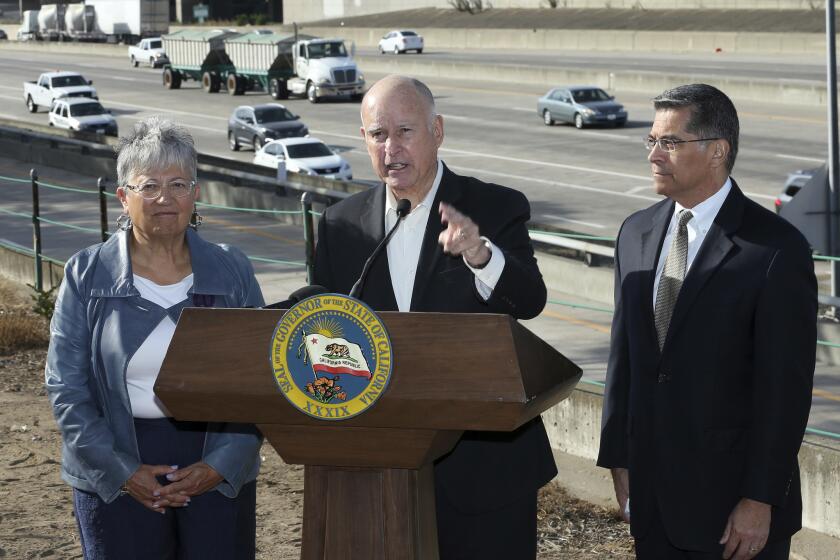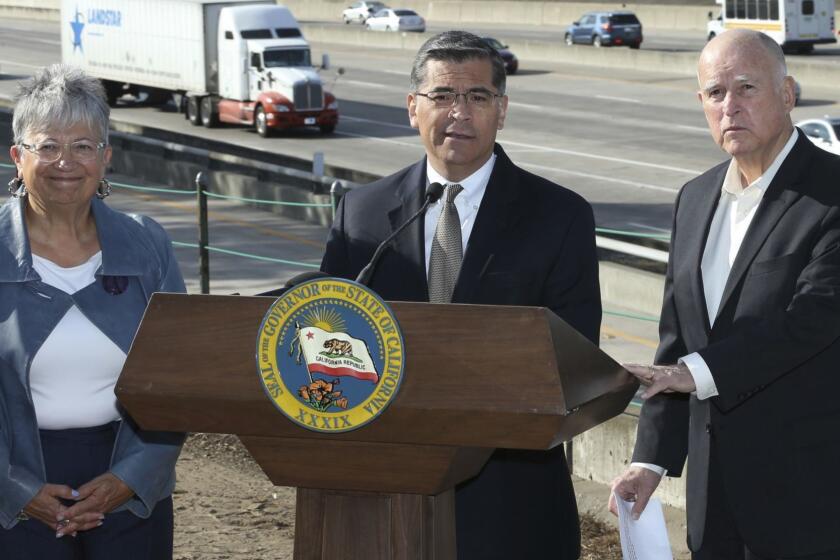Column: Trump’s attack on California cap-and-trade program is amazingly hypocritical
- Share via
President Trump’s war with California has come off as petty and absurd from the inception. But his latest sally, aimed at invalidating the state’s cap-and-trade anti-pollution agreement with the province of Quebec, plumbs new lows in hypocrisy.
The administration launched the attack Wednesday with a lawsuit filed in federal court in Sacramento. In the filing, the government asserts that the state’s agreement with the Canadian province to operate their cap-and-trade programs jointly is tantamount to pursuing “an independent foreign policy.”
That’s unconstitutional, the lawsuit argues, because the Constitution reserves the making of foreign policy to the national government. Moreover, the Constitution forbids states to “enter into any Treaty, Alliance, or Confederation” with a foreign country. The idea, according to the lawsuit, is to ensure that the United States speaks with a single voice in “matters of foreign affairs.”
If you could uncover the conversations in the White House, the order has gone out to do anything to undermine California’s leadership.
— Ann Carlson, UCLA
On the surface, this might seem clear-cut. It’s not, for several reasons. Before we delve into that topic, we must observe that the government gives away its real complaint about California on the very second page of its lawsuit. There, it grouses that “California’s actions ... have had the effect of enhancing the political power of that state vis-a-vis the United States.” And it frets that California’s deal with Quebec could “encourage other states” to do the same.
That’s one example of the hypocrisy embedded in the lawsuit. “They’re afraid of California’s leadership,” says Ann Carlson, professor of environmental law at UCLA. “If I had to guess, if you could uncover the conversations in the White House, the order has gone out to do anything to undermine California’s leadership.”
Trump’s authority to revoke California’s waiver from federal clean air rules rests on a very shaky legal foundation.
The administration’s abject fear of California has emerged in other ways, as Carlson observed in a post at UC’s Legal Planet blog on environmental law and policy on the day of the lawsuit.
There she listed the myriad initiatives the Trump White House has launched to attack the state’s environmental policies: “Revoking the state’s permission to regulate tailpipe emissions from cars, investigating auto makers for antitrust violations for cooperating with California on reducing car emissions, threatening to revoke highway funds from the state for Clean Air Act violations while simultaneously taking away the state’s best tool for cleaning up its air, and threatening to sue San Francisco for Clean Water Act violations related to its homeless population.”
The cap-and-trade program is a linchpin of California’s war on greenhouse gas emissions. It allows emitters of air pollution such as refineries to buy “allowances” enabling them to temporarily exceed the state’s emissions caps. The inventory of allowances shrinks and their minimum prices rise over time, reducing the volume of permitted emissions. The goal is to force industries to reduce greenhouse gas emissions but give them flexibility in how and when they do so.
The program has had its ups and downs, but on the whole, it’s been praised for its design and effectiveness. It also has survived numerous legal challenges, including state court lawsuits aiming to overturn it as an illicit tax. The state Supreme Court upheld the program in 2017.
California’s climate deal with automakers shows the proper solution to Trump is to go around him.
Since pollution knows no political boundaries, California has tried to expand it through cross-border allowances, reaching the agreement with Quebec in 2013 and another with the Canadian province of Ontario in 2017. A conservative provincial government later withdrew Ontario from the arrangement.
Those deals were designed to expand the market subject to the cap-and-trade program. They involved allowing emitters to trade allowances across the jurisdictions and holding joint auctions of allowances, among other provisions.
As Carlson observes, however, they didn’t place binding obligations on each other, much less bind the federal government to their provisions. They’re entirely voluntary, as is demonstrated by Ontario’s unilateral withdrawal.
There lies another irony — or hypocrisy, if you will — of the Trump lawsuit. In its September attack on the waiver allowing California to set its own auto emission standards, the Trump administration argued, in effect, that California’s impact on greenhouse gas emissions in a global context is too meager to warrant giving the state such broad authority.
“The waiver would result in an indistinguishable change in global temperatures and ... likely no change in temperatures or physical impacts resulting from anthropogenic [man-made] climate change in California,” the administration asserted in its proposed rule revoking the waiver. Yet in this case, it’s trying to undermine a program designed to expand the reach of a climate-change program.
The weakest element of the government lawsuit may be its claim that California’s program “interferes” with Trump administration policy on climate change. This is an example of the administration stepping on its own toes.
There was a fair amount of perplexity at the California Air Resources Board on Feb. 21, when the Trump administration abruptly announced that it had decided to “discontinue discussions” with the state’s air quality regulator over the administration’s proposal to gut federal auto emissions standards.
Although Trump himself has called climate change a “hoax,” and has moved to withdraw the U.S. from the 2016 Paris agreement, official U.S. policy still recognizes climate change as a global crisis. Carlson observes that the Department of Justice and the Environmental Protection Agency both “acknowledge not only the existence of climate change but its severity.”
In November, complying with federal law, the administration issued the Fourth National Climate Assessment as an official government document. The assessment states that “climate change creates new risks and exacerbates existing vulnerabilities in communities across the United States, presenting growing challenges to human health and safety, quality of life, and the rate of economic growth,” and that “climate change is expected to cause growing losses to American infrastructure and property and impede the rate of economic growth over this century.”
It calls on “communities, governments, and businesses” to take action “to lower greenhouse gas emissions.” In other words, far from interfering with official government policy, California’s arrangement with Quebec supports that policy.
The lawsuit tries to evade that point by defining administration policy as aimed at “reconciling protection of the environment, promotion of economic growth, and maintenance of national security.”
MIT’s obituary of donor David H. Koch lauded him for donating to cancer research, but ignored a career undermining science.
The subtext here is aimed at placing economic walls around climate change policy — specifically, subjecting policy to short-term economic concerns as a distraction from the long-term economic consequences acknowledged in the administration’s own assessment. This is a common dodge among opponents of strong climate change policies: “We can’t afford it.” Of course, the truth is that we can’t afford to act otherwise.
It’s quite possible that Trump’s lawsuit will win support from the conservative judges he and previous Republican administrations have put on the federal bench. But the emerging legal opinion is that he does not “have a case” even though “constitutional doctrine about foreign affairs is notoriously mushy,” Carlson writes. California’s own program would continue even if the courts throw out its arrangement with Quebec.
The lawsuit expresses nothing like genuine concern about federal prerogatives and the conduct of foreign policy. It’s an expression of infantile spite, but its consequences are universal.
More to Read
Inside the business of entertainment
The Wide Shot brings you news, analysis and insights on everything from streaming wars to production — and what it all means for the future.
You may occasionally receive promotional content from the Los Angeles Times.















